Officials at Tennessee’s Vanderbilt University ended a late-night sit-in protest against Israel in one of the prestigious institution’s main buildings after locking in students without access to food, water or sanitation facilities.
Boycott, Divestment and Sanctions (BDS) protesters were seen breaking through campus security and entering the university’s Kirkland Hall on March 26, starting a major sit-in that has so far resulted in several arrests, including that of a local reporter who then he was released.
Security footage released by the 151-year-old university shows a swarm of protesters walking past a lone security guard at the front door of the building, where Vanderbilt Chancellor Daniel Diermeier’s office is located.
They took control of the building, but many allege that campus police locked them down as a pressure tactic.
The sit-in began after the university administration refused to allow students to vote on changing the student government constitution to prevent funds from being spent on protesters’ targets.
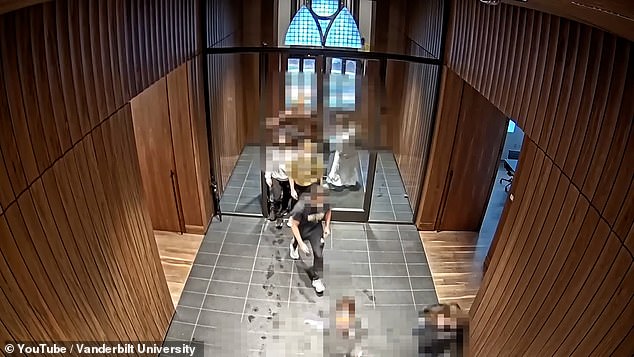
Security footage released by the 151-year-old university shows a swarm of protesters shoving a lone security guard at the building’s front door.
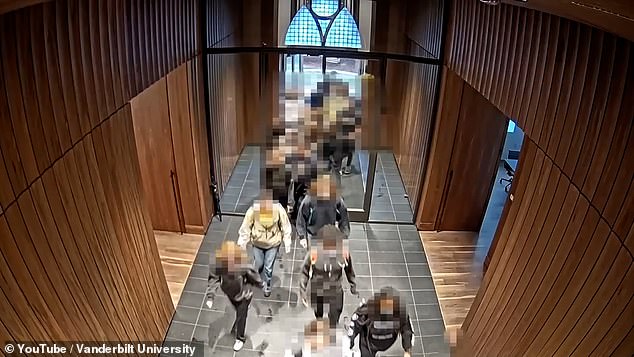

They took control of the building, but many allege that campus police locked them down as a pressure tactic.
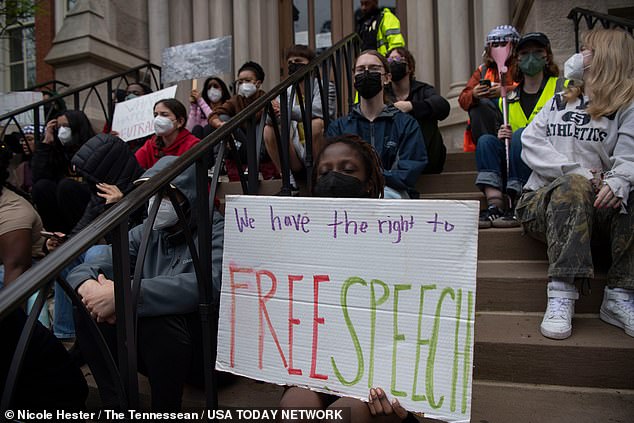

Protesters said that once inside, they were forcibly prevented from leaving.
Protesters said that once inside, they were forcibly prevented from leaving. Videos taken from inside the building, shared on social media, showed them sitting on the floor, arm in arm and mocking campus security.
In one video, protesters are heard telling a police officer, who is black: ‘You are black in America and you are NOT on the side of the world’s marginalized people.’ What does that make you?
‘32,000 dead and you don’t care. You could stand with us and be on the right side of history, but you won’t.
Protesters then shouted “shame” at him.
But as the protest stretched into the night, many wanted to leave for medical reasons.
A video shared on social media showed a protester calling 911, claiming he was worried that if he went outside he would be arrested, but that if he stayed inside he would go into ‘toxic shock.’
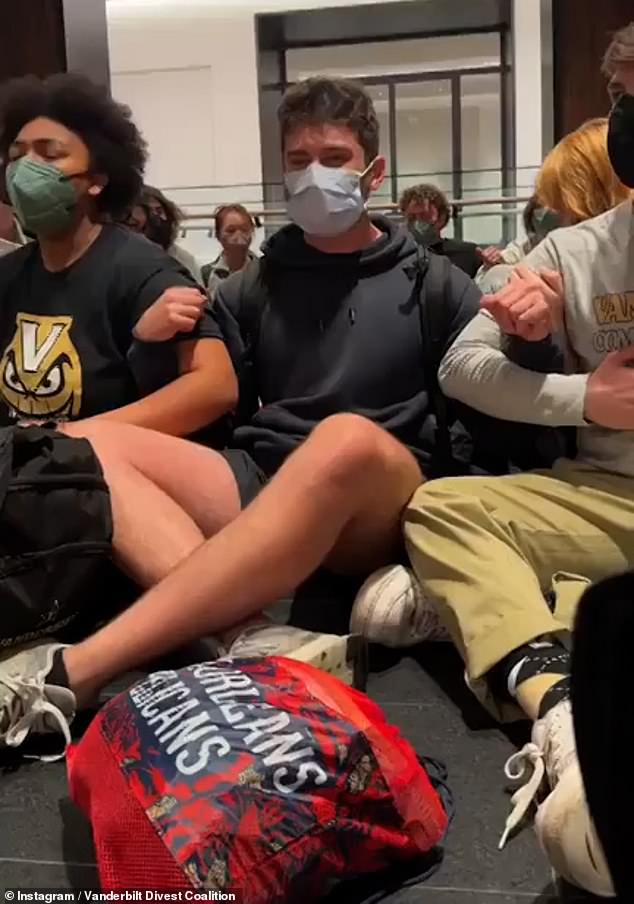

Videos taken from inside the building and shared on social media showed them sitting on the floor, arm in arm and mocking campus security.
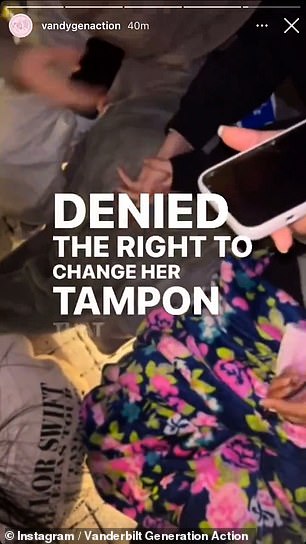

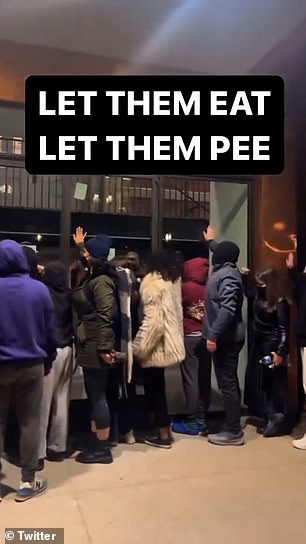

A video shared on social media showed a protester calling 911, claiming he was worried that if he went outside he would be arrested, but that if he stayed inside he would go into ‘toxic shock.’
They said: ‘There is currently a student who is being denied the right to change her tampon which has been in for several hours, leading to an increased risk of toxic shock syndrome.
“If she gets up to go to the bathroom to change her tampon, (campus police) threaten to arrest her, so it’s not an option for her.”
Another video shared on social media showed other protesters banging on the building’s windows and chanting over and over: “Let them pee, let them eat.”
Ultimately, four students were arrested and suspended from the university, while 12 others were only suspended for their role in the protest, after everyone inside voluntarily left.
“All protest participants who broke into the building will be provisionally suspended,” the university said. Suspension means they must leave campus and cannot return pending a Student Affairs review process.
Three students were charged with misdemeanor assault because they shoved a community service officer and a staff member who offered to meet them when they entered the building, the school said.
A fourth student was charged with vandalism after breaking a window.
Nashville Scene reporter Eli Motycka tweeted that he was there to cover the protest when he was arrested and that the school’s charge against him “was immediately dismissed by the court magistrate for lack of probable cause.”
Opponents of Israel’s brutal war against Hamas, which has so far killed more than 31,000 people, including women and children, have used the BDS movement as a non-violent way to protest.
The movement seeks to attack companies and organizations that it claims support Israel’s policies.
Supporters say boycotting these groups and asking others to get rid of them puts pressure on them to stop working with Israel.
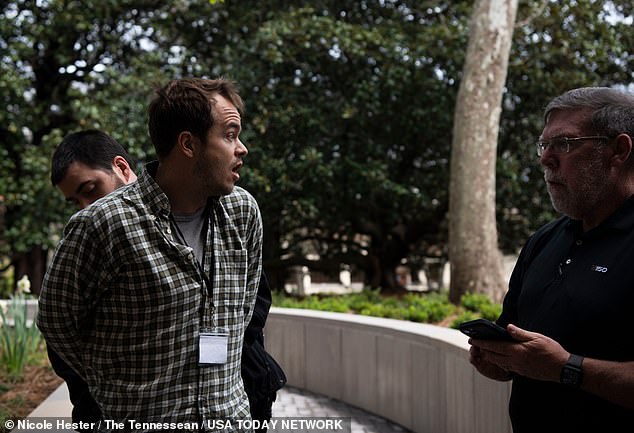

Nashville Scene reporter Eli Motycka tweeted that he was there to cover the protest when he was arrested.
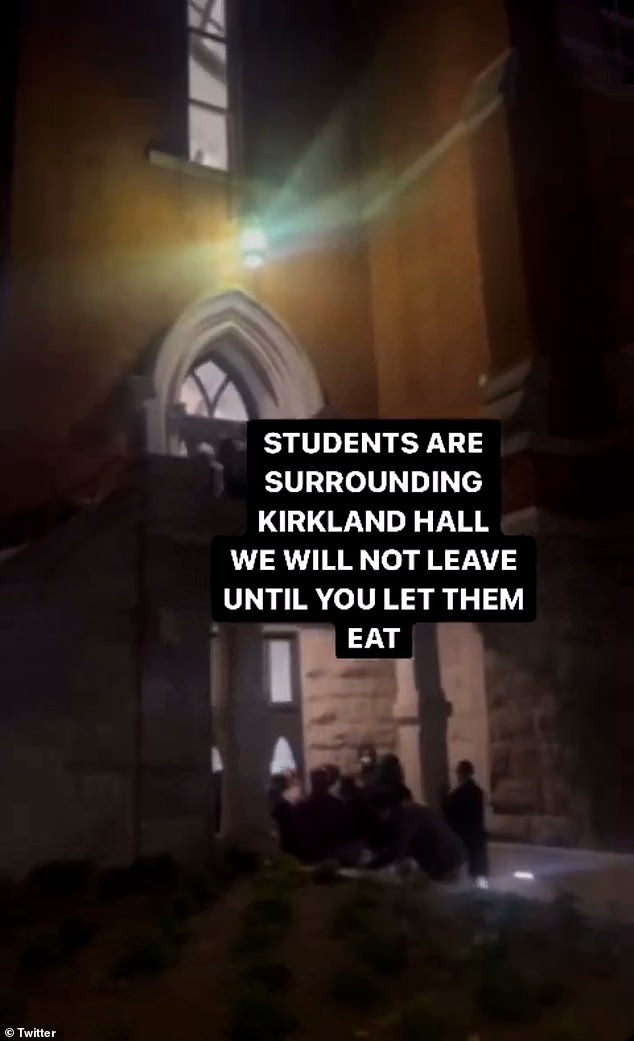

Opponents of Israel’s brutal war against Hamas, which has so far killed more than 31,000 people, including women and children, have used the BDS movement as a non-violent way to protest.
BDS supporters have attacked McDonald’s and Starbucks. Earlier this month, Starbucks’ Middle East operations announced they would be cutting thousands of jobs in light of the BDS movement.
Alshaya Group, which runs the coffee giant’s Middle East subsidiary, said the layoffs were “the result of continually challenging trading conditions over the past six months.”
McDonald’s also said it faced a “significant business impact” in the Middle East as a result of the war in Gaza, and Yum! Brands, which runs KFC and Pizza Hut, said “sales were affected by the conflict in the Middle East region with varying degrees of impact.”
Universities like Vanderbilt have become hotbeds for student-organized BDS protests.
Earlier this month, the Columbia College Student Council endorsed a boycott equivalent to ‘$1 million in student fees’ against companies it views as supporting Israel.
In February, the UCLA Undergraduate Association Council passed a BDS resolution aimed at pressuring Israel to stop its “genocide.”
And in January, Harvard University saw dozens of protesters gather outside the Chase Bank site in Harvard Square to protest the bank’s investment in Elbit Systems, the main weapons manufacturer for the IDF.
A Vanderbilt spokesperson told MailOnline: ‘Freedom of expression is a core value at Vanderbilt, as is civil discourse.
‘Our policies allow members of the Vanderbilt community to protest and speak out on issues they care deeply about. In recent months there have been dozens of peaceful demonstrations.
‘In consideration of the safety and normal operations of the university, we, as a matter of policy, define limitations of time, place and manner. The safety and well-being of our community is a top priority.
“The university will take action when our policies are violated, the safety of our campus is in danger, and when people intimidate or hurt members of our community.”

